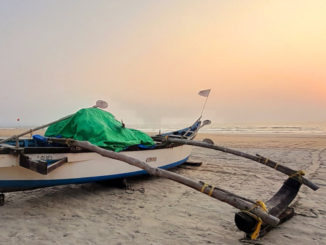PREFACE
REFLECTIONS ON FREEDOM
Oh dear!
12 April 2021 is the first day we’ve been let out of our cages and I’m frightened.
The world outside seems a big, scary and uninteresting place – please let me back into prison.
I’ve got used to unwashed clothes lying around on the bedroom floor – to unfiled papers overspilling the table onto the living room floor – to unswept crumbs on the carpet beneath the chair at which I sit for most of the day whilst “working” on my computer – to lever-arch files beyond the crumbs containing records of past voyages and cycling expeditions.
It would need so much effort to tidy up all these consequences of Lockdown Life.
And to what end?
I’m now allowed to visit some campsites if I am totally self-sufficient, because they’re not allowed to open their “facilities” with showers and toilets but still charge £ 20+ per night for the privilege of staying with them along with many others also celebrating their “freedom”.
It will be safer and less effort to just stay where I am and continue living in a slum, especially as getting up and getting dressed is proving ever more difficult as my limbs no longer seem to be working as they did before.
Still, I give thanks for small mercies, and pray every night that our wonderful NHS and marvellously responsible Government will continue to look after me so well.
AN UNPLANNED INTRODUCTION
This article is an extended version of the one I originally planned, written as a consequence of the announcement today, 9 April 2021, of the death of HRH Prince Phillip, the Duke of Edinburgh. The extension is based on an email I have just sent my immediate family, some of whom live in Australia.
Hi,
A WALK IN THE PARK AND NATIONAL STABILITY
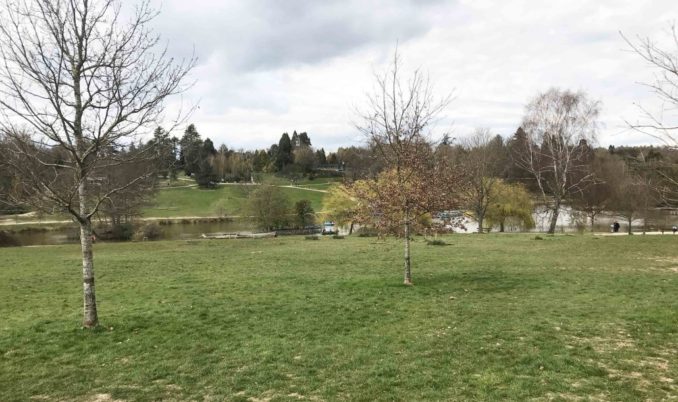
Went for another walk/shop today.
The field in the park was drier than it has been recently so I walked uphill from the path towards the top end of the car park and took this pic.
Also shared a bench with another oldie who was interested in Roman and Greek History and English Literature so we had a good old chinwag.
On another bench, I read again the essay in Churchill’s “Great Contemporaries”, about Alfonso XIII, ex-King of Spain.
Churchill wrote this in 1931 and was mainly concerned with the fall of the Monarchy preceding the Spanish Civil War. I was particularly struck by these remarks about its causes –
“The troubles which led to the fall of the Monarchy in Spain came slowly to a head. Their origin lay in the breakdown of the parliamentary system through its lack of contact with realities and with the public will. Parties artificially disciplined and divided produced a long succession of weak governments containing few, if any, statesmen capable of bearing a real responsibility or wielding power adequate to the occasion.”
Churchill thought Alfonso was equal to the task until he could contain the pent-up pressures no longer and went into voluntary exile in Italy in order to avoid a civil war, partly fostered by Catalan Separatism which is still such an active force today.
Churchill’s assessment was that Alfonso did well to contain matters as long as he did, and went on to write.
“It is therefore as a statesman and as a ruler, and not as a constitutional monarch acting usually upon the advice of ministers, that he would wish to be judged, and that history will judge him. He need not shrink from the trial”.
History has not been as kind to Alfonso as Churchill hoped.
In 1936 (the year of my birth), the Army rose up and kicked out the Republic formed in 1931. That led to the Spanish Civil War between the nationalists, led by General Franco supported by Hitler and Mussolini , and the Communists supported by Stalin. Many idealists from other countries, such as George Orwell before be became diillusioned with communism, were killed or wounded fighting for the communists. Afficionados will love the film “For whom the Bell Tolls”, set in 1937, whose title was taken from John Donne’s 1624 poem and used in a novel with the same name by Ernest Heminway, a journalist reporting on the war at the time, and starring Gary Cooper and Ingrid Bergman.
The war was deemed by some to be a rehearsal for WW II, including as it did, the first bombing of civilians from the air in Guernica. It ended in 1939 but the Dictatorship lasted until 1975 when Franco died. He was succeeded by restoration of the Monarchy in 1978 in the person of Juan Carlos, Grandson of Alfonso XIII, after passing over his son Juan, Count of Barcelona. Juan Carlos I abdicated in 2014 in favour of his son Felipe VI, Great-Grandson of Alfonso XIII, and still the King of Spain today.
I only learned of the Duke of Edinburgh’s death upon returning home and cannot help thinking there are many parallels with our current situation in the UK.
World financial stability is fragile, unemployment is high and rising, Boris Johnson’s Government is weak and divided despite its apparently secure majority in Parliament. I certainly think it has “lost contact with realities and the public will” though appreciation of that has been disguised by the massive publicity campaign it has launched (at taxpayer’s expense) to justify its removal of traditional freedoms. There are hints from time-to-time that Boris himself may appreciate that but is too indecisive or weak to do anything about it.
Although never claiming the limelight, Prince Phillip was a hugely stabilising influence. Charles is widely thought to be a “Woke” nonentity, Harry and Meghan are despised, and Kate alone, as wife of the second in line to the throne, is seen to have the behaviour and style that might preserve the Monarchy if she could become Queen soon enough, even though William would be the formal Monarch. Reservations about all of them exist because of their apparently uncritical support for “Green” issues and the WEF agenda.
Will Phillip’s death, and the Queen’s, which cannot be far behind, result in a Republic? – will Charles be passed over in favour of William? – Will Scottish Nationalism do for the UK what Catalan Separatism did for Spain in 1931?
Mark Twain said – “history never repeats but it often rhymes”.
Even if the UK survives as a United Kingdom with a constitutional monarchy, the factors mentioned above must strongly favour Australia becoming a Republic – perhaps Kevin Rudd will be President yet!
Or perhaps Bill Gates or one of his ilk will emerge from the shadows and be declared Governor of the Western World.
We “commoners”, and “deplorables”, have always been seen as irrelevant in our own time so anything I write won’t make any difference to national or world events. I still hope the UK avoids a repeat of 1642 and a new National Dictatorship, and also avoids Supranational Governance.
Australians will have to look after themselves – or perhaps they will unite amongst themselves and with others in the Commonwealth to defend traditional liberties.
It’s unlikely I’ll live long enough to find out what happens but hope, as ever, that my musings may interest and help the younger generation to cope with whatever the future holds for them.
End of unplanned introduction
ANOTHER RESPONSE
It is becoming a habit to respond to comments on an earlier article. But one I quite enjoy because I think it enriches the lives of both author and people who comment.
In making that remark I have particularly in mind the post from “Bertram Gilfoyle” who said
Thanks AM. Mate of mine has bought an ocean going yacht (don’t ask, but it is one of the older ones that’s built for it, not a gin-palace) with the intention of circumnavigating. He’s coming on 61 and fit. Hope he has fun (not my idea of fun tho!)
I have tried in these articles to encapsulate a good bit of my own experience that I thought might be helpful to others, so I hope Bertram will draw his friend’s attention to them. I would also be happy to exchange emails with Bertram’s mate, or any other like-minded reader, who thought I might be able to help with preparations for their own adventure – if that appealed I would want to contribute by creating an anonymous email address that could be shut down easily if it was abused by trolls.
I also noted that “BBC Tumbleweed Watch” has looked at videos on You Tube’s “Old Sea Dog” channel. I too have watched several episodes of that which mirror many of my own experiences. Happily, Old Sea Dog is still enjoying life at sea, though sadly, I have become too old to do so.
I confess also to having sometimes felt the same way that “Archbug” did when writing
Had a few mates , all pensioners, round this lovely evening for a few drinks in the garden. Whilst it was nice to get together again, the spark was missing. Extended lockdown has created mild depression from the sheer boredom. We are lucky with no financial worries but I wonder what long term mental problems will arise. Perhaps the young will recover quickly but for us oldies, losing a year of our active remaining life has taken a toll on me, at least. Years ago, I once suffered from acute depression and whilst this is nowhere like that I can feel the signs of lack of enthusiasm for life in general that depression brings on. Others must be far worse than me.
I recommend that Archbug tries writing some articles for Going Postal. There’s nothing like having to concentrate ones mind on past pleasures to displace gloomy thoughts about the present.
In a slightly more jovial mood I also say to “Let England Shake” that I did have some pretty unsettling experiences when the engine didn’t start, and to “Eriction SPQR” that I never did shoot an albatross but did enjoy scenes of them nesting and caring for their young. Perhaps I’ll get round to describing both in due course.
Now, back to the early days of my story.
SAILING CLUBS AND ASSOCIATIONS
During my paper research whilst Alchemi was being built, I had explored the existence of clubs and associations for leisure sailors within reach of my flat in Kent.
There were of course a number of “Royal” yacht clubs around the country but they were the successors of the Yacht Racing types of sailing enjoyed by earlier generations and were, I thought too grand and with too wealthy a membership to be of much relevance to me.
At the other extreme were smallish clubs in various coastal towns into which I could see myself fitting, but they were some distance from where I lived and their members were mostly interested in local day-sailing whereas I wanted to meet people interested in longer distance sailing over an extended period.
In the end I settled on the Cruising Association for 2-3 years. This organisation, with a Headquarters in London, was founded in 1908 and succeeded the smaller Cruising Club first established in the late 1800’s. Both were formed to support and foster cruising in private yachts rather than racing. Its founding members were pretty well-off but not mega-rich like most of those in the racing fraternity. Later, I felt the CA didn’t match my needs as closely as I hoped and joined the Ocean Cruising Club. Perhaps more about that in later articles.
After its early formation the CA thrived and by the mid 1990’s was itself pretty wealthy and a little stuffy and over-managed to my mind by a General Committee and a number of specialist ones. However, it supported the type of sailing in which I was interested, it had a magnificent HQ building in Limehouse Docks near the Centre of London and a wonderful library of sailing books and paper charts for much of Europe.
One of its members also had a garage-full of second-hand charts he sold to members for a fraction of the price new editions cost. I remember he had a sliding scale of prices ranging from close to the original value for “nearly-new”, through medium for older but still updated ones to a pound or two for out-of-date ones about which he always used to say – “the rocks don’t change”. As I mentioned before these were very early days for electronic charting.
WHERE TO GO IN 1997 ?
Alchemi was exhibited at the Southampton Boat Show in September 1996 and afterwards I kept her at Swanwick Marina on the River Hamble for a couple of months before going back to Falmouth for winter storage on land.
At the end of September I started to think about voyage planning for 1997 and was often to be found in the CA library poring over books and charts working out distances, times and possible stopping places.
My first idea was to circumnavigate the UK but when I looked at the nature of England’s East Coast I decided it had a great deal of shallow water and sandbanks with relatively few harbours for a considerable distance once north of Ipswich.
So I thought – Why not go across the North Sea, look into the Baltic, and then go up the west coasts of Sweden and Norway to the limit of my insured cruising area at Bergen and then cross back to Scotland in the far north.
I sounded out most of the people I’d already met in the sailing world and got some expressions of interest but a general avoidance of commitment to make a specific arrangement. In my journal written at the time I noted – “In truth I suppose I had hoped I would find one or two people who wanted to come for a large part of the voyage but I now realised this was an unachievable dream. Instead I should plan on a series of different people joining me for limited sailing legs of two or three weeks at a time. By heck, to do that I’m going to have to put in some serious effort to plan the logistics in detail”.
At the time I had a pretty basic laptop running Windows 95 as I remember, with very limited mapping and editing software. I realised that showing the full voyage on a single printed page required production of my own map, however primitive it might be. This was the result –
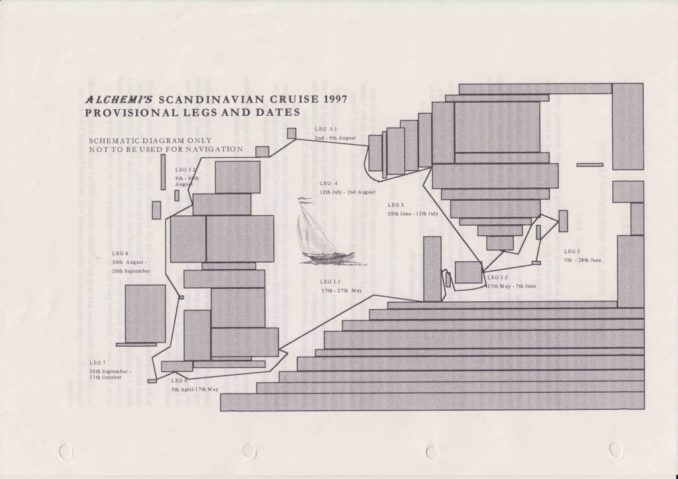
It wasn’t a very good map but it was good-enough to be able to propose a series of legs for the total distance, each of which would start and finish on definite dates at a place that was reasonably accessible.
The first step in doing that was to make a broad-brush general time-table. It would be too cold in the Baltic before the end of May and I needed to get past the West of Scotland and Ireland by the middle of October to avoid winter storms – furthermore that would be easier if I returned via the Irish Sea and avoided the exposed West Coast.
RECRUITING COMPANIONS
The CA operated a boat and crew matching service to facilitate skipper/owners meeting with boatless crewing members to explore mutual interest in sailing with one another. This took the form of large meetings in the autumn and following New Year during which Skippers would perform a Dog and Pony Show by standing in front of an assembled throng to tell the crowds something about themselves and their boat, where they planned to go next season and when. They would then conclude by saying – please come and talk to me later if you have an interest in coming with me.
Doing that in early February 1997 improved progress now people had something tangible to consider but there was still quite a lot of fence-sitting with people saying things like – “Oh I’d love to come but I’m not sure I can”.
I started sending round a series of Newsletters reporting on physical progress with fitting Alchemi’s self-steering gear but excluding the long range radio replaced temporarily by a mobile ‘phone and modem linked to my laptop that I hoped would be good enough for a coastal voyage. I also reported the latest crewing developments and my evolving ideas on route refinements.
NEED FOR COMPATIBILITY
I knew from general experience during my working life, and the limited sailing I had so far done, that personal compatibility was just as important as technical knowledge or even more so.
At crewing meetings in the CA therefore I always said to anyone showing interest – we must have some time on the boat with one another before I leave on the second leg next year. As the first leg would be around the English south coast with frequent opportunities to jump off if things didn’t work out I was content to use that for shakedown sailing with people who had not come with me before, if we couldn’t organise a suitable occasion before then.
I cannot overemphasise the importance of this.
A small yacht is a very confined space and people on one live in closer proximity to one another and more continuously than in any other circumstance – except perhaps in a spacecraft.
It is very easy for one person or another to take offence for some reason, “you’re always bossing me about”, “you’re too fussy about how the furling line is cleated off” etc etc . Then and later I rated the need for inter-personal compatibility to be much more important than technical skill, RYA qualifications held etc.
I knew I could sometimes be a bit of a pain to others, especially when I’d been sailing Alchemi for longer than I had in 1997, because I was so familiar with the way in which she behaved, why using one cleat rather than another was best because of some future need for the same cleat, etc, etc.
But it worked the other way too and I couldn’t stand a guy who many years later told me “I shall have to be in charge because I’m a YachtMaster Instructor and you’re only a Day Skipper”.
Fortunately, I didn’t have that sort of problem on the 1997 cruise but was glad one or two possibilities fell through after only a weekend sail together because I think there would have been trouble had either of us tried to persist with an effort to gloss over incompatibilities.
SHAKEDOWN SAILING
For each leg of the voyage I developed a provisional plan of harbours at which to stop , like this one from Falmouth to East Anglia.
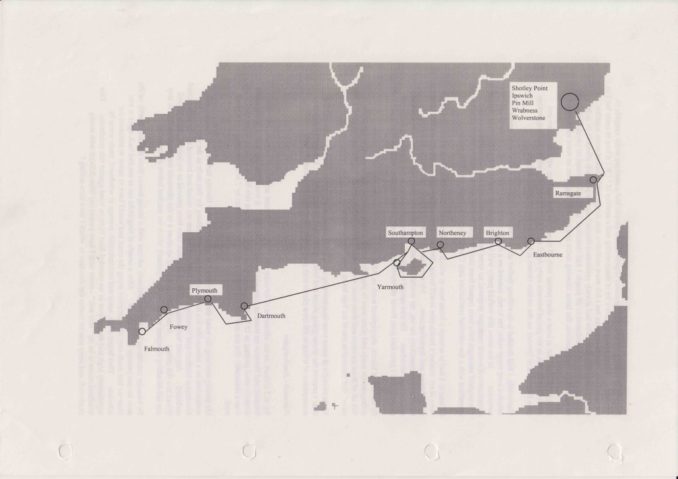
The plan for foreign parts of the cruise was that people joining me at the first port along the route would stay until the last on that leg but there were several planned crew changes on the first leg from Falmouth to Wolverstone Marina in Essex.
That made it possible for each subsection to be used for a relatively short passage with some-one who would join me later in the year. This was ideal for shakedown purposes and avoided the need for people joining and leaving the yacht for that reason to make long and expensive journeys before finding out whether we’d get on well enough with one another.
By this time I had already sailed the return voyage from Falmouth to the Solent a couple of times, incuding the overnight passage across Lyme Bay where there are no practicable intermediate stops, so I have nothing much to add to that.
Circumnavigating the Isle of White was new as was going in and out of the Emsworth Channel to Northney Marina on Hayling Island.
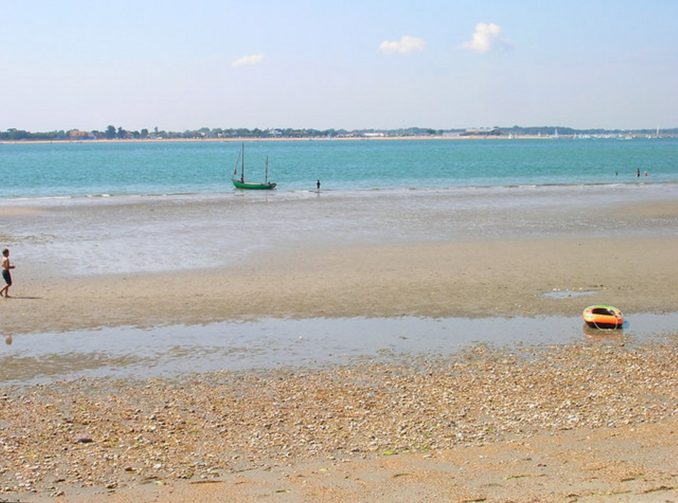
The same is true for the rather featureless coast along to Brighton with its artificial harbour and awkward entrance, then past the striking white cliffs of the seven sisters on the South Downs to another shallow entrance into Eastbourne Marina.
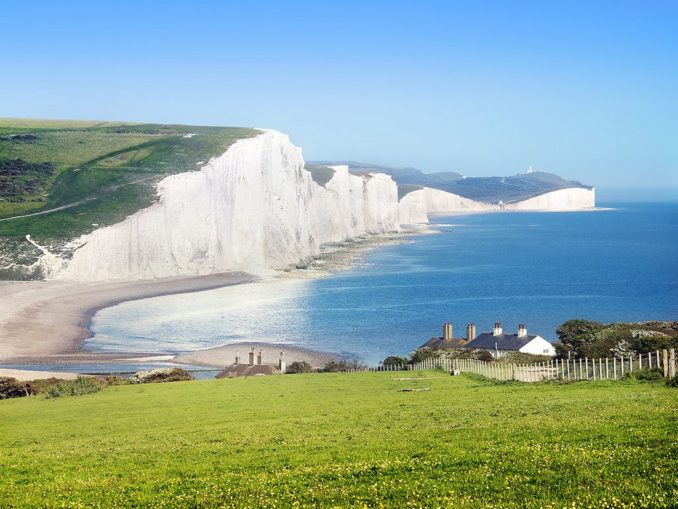
I remember using the radar as we approached the narrowest part of the English Channel and being appalled by an apparently continuous wall of ships on the screen as they crossed the channel from Dover to Calais and Boulogne before getting close enough to see there were gaps between them if you moved quickly – and didn’t get too worried about the catamaran ferries zooming around at 40mph and more.
It was a relief to round the SE Kent coast and only have to worry about the Goodwin Sands and other banks off Ramsgate, in the Thames Estuary, and off the Essex coast. Passing between Harwich and Felixstowe into the confluence of the rivers Stour and Orwell required concentration. Entry into the lock gates of Shotley Point Marina and rising to a quite high level with the tide had its moments too. So did exiting again – keeping control of the yacht whilst paying out mooring lines to bollards above one’s head needs accurate timing to avoid a line getting jammed in a cleat.
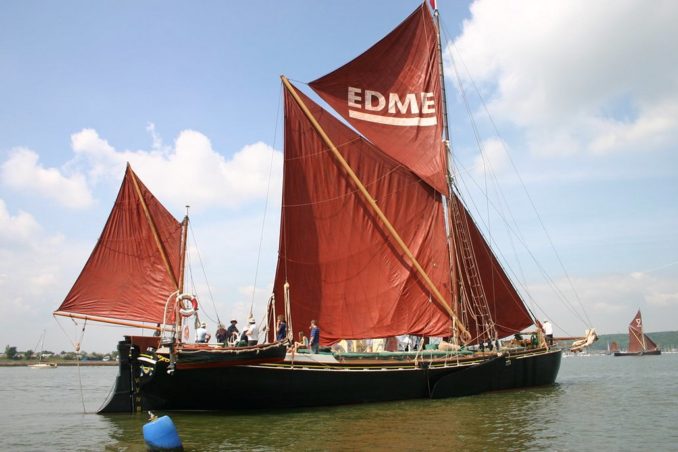
The Stour and the Orwell have a long history of sailing and whilst in the area for a few weeks Alchemi went up and down them to Ipswich, to a well known pub at Pin Mill and to one or two other places as well. Pin Mill is famous as a place where the operators of Thames Barges used to congregate.
These enormous craft were working boats carrying cargo up and down the coasts of Essex, Suffolk, and Kent, mostly to carry supplies of all sorts into London. They were famous for being crewed by a man, a boy and a dog and had a very shallow draft to reduce the risk of getting stuck on the many sand and mud banks. That made them very vulnerable to leeway – being blown sideways – and to counter that when in deep enough water they had a lee board on both sides so the leeward one could be lowered into the water to act as a temporary keel, whichever tack the barge was on.
By early May, the physical additions to Alchemi, the plans for the voyage and the crewing arrangements were all as well prepared as I could make them and I left her for a short time at Wolverstone Marina on the Orwell, “ready for the off” and the first leg across the North Sea.
To be continued …………….
© Ancient Mariner 2021
The Goodnight Vienna Audio file
Audio Player



